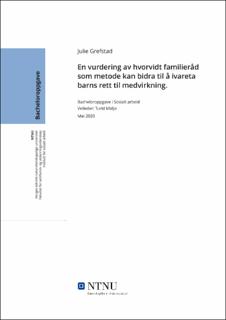| dc.contributor.advisor | Midjo, Turid | |
| dc.contributor.author | Grefstad, Julie | |
| dc.date.accessioned | 2021-09-28T18:44:03Z | |
| dc.date.available | 2021-09-28T18:44:03Z | |
| dc.date.issued | 2020 | |
| dc.identifier | no.ntnu:inspera:56776074:22064476 | |
| dc.identifier.uri | https://hdl.handle.net/11250/2785633 | |
| dc.description.abstract | Internasjonal og norsk lov har tildelt barn visse rettigheter. En av disse rettighetene er retten
til medvirkning. Alle barn har rett til å bli hørt i saker som berører dem. Barnet vil ikke
bestandig være klar over sine rettigheter, derfor er det i barnevernet sosialarbeideren som
sitter på dette ansvaret. Det finnes flere metoder som tar sikte på å inkludere barnet i større
grad og som dermed muligens innfrir kravet om medvirkning. Familieråd er en slik metode. I
familieråd er barnet i sentrum og hovedmålet med metoden er å forbedre situasjonen for
barnet.
Forfatteren har gjort en litteraturstudie for å undersøke hvordan familieråd som metode kan
blir brukt av sosialarbeidere i barnevernet for å ivareta barnets rett til medvirkning. Familieråd
bidrar til å anerkjenne barnets perspektiv ved å sette barnet i sentrum. Anerkjennelse er viktig
for at barnet skal realisere seg selv og føle seg betydningsfull og viktig. Barn som ikke blir
anerkjent kan ha utfordring knyttet til identitetsutvikling senere. Familieråd har derfor et stort
potensial for å ivareta barns rettigheter til brukermedvirkning i barnevernet. Dette har
undertegnede fått bekreftet av flere uavhengige kilder som viser til at metoden bidrar til å
utjevne maktbalansen mellom profesjonsutøver og bruker. Det kreves mer prioritering av tid
og ressurser i norsk barnevern for å implementere metoden. Godt forarbeid ved bruk av
familierådsmetoden er funnet til å være essensielt for at barnets rett til medvirkning skal
fungere best mulig.
Metoden har noen sentrale utfordringer og muligheter på grunn av den ikke nødvendigvis
trenger å involvere sosialarbeideren under selve utførelsen av familierådet. Barnet kan bli
marginalisert dersom andre aktører tar for mye fokus. Sosialarbeideren kan også slite med å
identifisere slike situasjoner på grunn av at man ikke deltar. Forberedelse og dialog med alle
parter vil kunne hjelpe i slike situasjoner.
Nøkkelord: brukermedvirkning, barn, medvirkning, barnevernet, familieråd, makt og
deltakelse. | |
| dc.description.abstract | International and Norwegian law has given children certain rights. One of these rights is the
right to complicity. All children have a right to be heard in cases that regard them. The child
will not always be aware of its rights, and it is therefore the responsibility of the social worker
in the Norwegian children’s welfare to ensure they are secured. There exist several methods
that aim to include the child in a greater way and thus ensure the child’s right to complicity.
Family council is one such method. In family council, the child is in the centre. The main goal
with the method is to improve the situation for the child.
The author has done a literature study to review how family council as a method can be used
by the social workers in the Norwegian children’s welfare to ensure the right to complicity.
Family council contributes to recognize the child’s perspective by putting the child in centre.
Recognition is important for the child’s self-realization and its own self-perception. Children
that are not recognized may experience challenges with identity development later in life.
Family council therefore has a great potential to maintain and ensure children’s rights for user
complicity in the Norwegian children’s welfare. In the performed literature study, it is
confirmed by several independent sources that the method contributes to balance the power
differential between the professional social worker and the user. It was found that it requires
more prioritization of time and resources in Norwegian child’s welfare to implement the
method. Thorough preparatory work is essential when utilizing the family council method to
ensure the child’s right to complicity.
The method has some central challenges and opportunities because it does not necessarily
need to involve the social worker during execution. The child can be marginalized if other
stakeholders take too much focus in the council. The social worker can also have difficulties
identifying such situations because he or she is not taking part in the physical council.
Preparatory work and dialogue with all stakeholders can alleviate some of these challenges.
Index terms: user complicity, children, complicity, children welfare, family council, power
and participation. | |
| dc.language | | |
| dc.publisher | NTNU | |
| dc.title | En vurdering av hvorvidt familieråd som metode kan bidra til å ivareta barns rett til medvirkning. | |
| dc.type | Bachelor thesis | |
